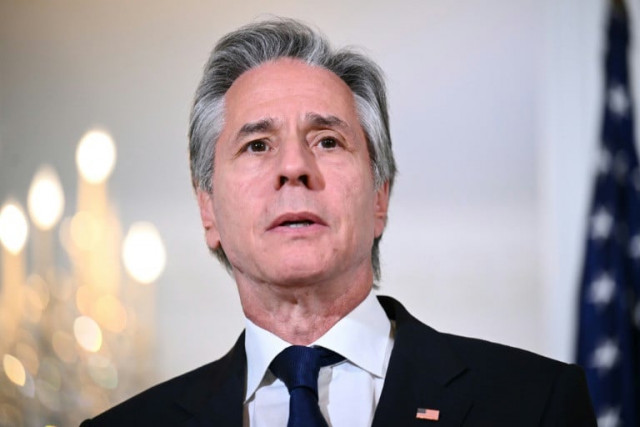US warns of ME conflict spread fears in Asia as UN urges steps to prevent Lebanon war
At the ASEAN meeting, US secretary of state said that the country is involved in diplomacy to stop further escalation

US Secretary of State Antony Blinken said on Friday there was deep concern in Asia about the prospect of conflict spreading in the Middle East, as the UN chief called for everything possible to be done to avoid “all-out war” in Lebanon.
The conflict in the Middle East was a central issue during Friday’s East Asia Summit in Laos, where Blinken said Washington was dedicated to using diplomacy to try to control the situation in the face of what he called an Iranian-led axis of resistance.
“The intense focus of the United States, which has been the case going back a year… (is) preventing these conflicts from spreading. And we’re working on that every day,” Blinken told a press conference.
“We’re working very hard through deterrence and through diplomacy to prevent that from happening. There’s also obviously deep concern that we share about the plight of children, women, and men in Gaza.”
The US has stressed to Israel the importance of meeting the humanitarian needs of people in Gaza, Blinken said, adding it was in Israel’s interest that people forced from their homes by hostilities in Lebanon are able to return.
The annual summit of the Association of Southeast Asian Nations (ASEAN) also included meetings with leaders and top diplomats from India, China, Japan, the United States, Russia, South Korea, Australia and New Zealand, as well as United Nations Secretary-General Antonio Guterres.
Friday’s discussions included the war in Ukraine, Myanmar’s civil war, climate change, tensions in the Taiwan Strait and concern about confrontations in the South China Sea, a key conduit for at least $3 trillion in annual ship-borne trade.
‘Escalation after escalation’
Guterres condemned an attack by Israeli forces on a watchtower that wounded two UN peacemakers from Indonesia, an incident he said violated international law and must not be repeated.
He said any spread of fighting in the Middle East would have dramatically negative impacts on the whole world and called for maximum restraint from all sides.
“I have never seen in my time as Secretary-General any example of death and destruction as dramatic as what we are witnessing here,” he told a press conference.
“We are seeing escalation after escalation, a regionalisation of the conflict that is becoming a threat to global peace and security.”
“We see an enormous tragedy in Lebanon. And we must do everything to avoid an all-out war,” he added.
Philippine President Ferdinand R. Marcos Jr made a plea before the regional leaders for all parties to be genuinely committed to managing disputes over the South China Sea, where his country has been embroiled in more than a year of confrontations with China.
The row has sparked fears those could spiral out of control, as US defence ally the Philippines accuses China of aggression, and Beijing expresses outrage over what it calls provocations and territorial infringements by Manila.
His remarks come a day after he called for ASEAN and China to urgently speed up negotiations on a code of conduct.
“These kinds of behaviour cannot be ignored, and demand of us concerted and serious efforts to truly manage our disputes,” Marcos said.
Malaysian Prime Minister Anwar Ibrahim, whose country takes over the ASEAN chair next year, said violence must be avoided and that Chinese Premier Li Qiang had given assurances that matters would be handled peacefully.
“This is an issue that affects all countries but the solution we propose, that is agreed upon by all, including China, is to avoid violence, use diplomatic channels, have negotiations,” he told a press conference.
Intensely focused
ASEAN and China on Friday issued a statement recognising the proliferation of online gambling crimes and telecommunications network fraud, more commonly known as scam centres, for which hundreds of thousands of people have been trafficked in Southeast Asia by criminal gangs, according to the UN.
In Egypt, Blinken to discuss bilateral ties, Gaza ceasefire
Blinken and the ASEAN leaders on Friday agreed to cooperate on Artificial Intelligence (AI) and strengthen its safety, security and trustworthiness, including developing compatible approaches to AI governance.
Blinken gave reassurances about Washington’s commitment to the Indo-Pacific region, regardless of the outcome of next month’s US presidential election.
“Even with everything else going on, our focus has remained intensely on this region,” he said.
“It’s my belief that basic approach will continue, irrespective of who’s president, because it’s so manifestly in our interest.”



















COMMENTS
Comments are moderated and generally will be posted if they are on-topic and not abusive.
For more information, please see our Comments FAQ